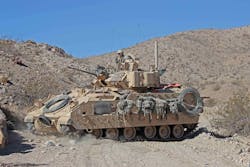Army eyes positioning, navigation, and timing (PNT) vetronics that resist electronic warfare (EW) jamming
ABERDEEN PROVING GROUND, Md. – U.S. Army land warfare experts are asking the Raytheon Technologies Corp. (RTX) Collins Aerospace segment in Cedar Rapids, Iowa, to build additional vetronics systems to assure accurate positioning, navigation, and timing (PNT) for its fleet of combat vehicles when signals from Global Position System (GPS) satellites are blocked or jammed.
Officials of the Army Contracting Command at Aberdeen Proving Ground, Md., announced a $24.9 million contract in August to Collins Aerospace for Mounted Assured Positioning, Navigation and Timing Systems (MAPS).
The latest version of the Collins Aerospace MAPS, the MAPS Gen II system, keeps up with the pace of current and future enemy threats and technologies, Collins officials say. Collins initially won a $64 million Army contract in June to build MAPS vetronics units.
The MAPS Gen II system is composed of the Collins Aerospace NavHub-100 navigation system and Multi-Sensor Antenna System (MSAS-100), and is designed to boost protection against evolving GPS threats. It include Military Code (M-Code) capability and improved levels of reliability through modernized signal tracking to enhance GPS integrity, Collins officials say.
NavHub-100 generates and distributes assured position, navigation and timing (APNT) information to all combat vehicle systems, and provides accurate navigation amid GPS threats by fusing data from several different sensors.
NavHub-100 offers modern signal tracking to ensure GPS integrity; supports the Defense Advanced GPS Receiver (DAGR) standard interface; includes an M-Code security-certified circuit card.
The MSAS-100 offers additional protection by using the ground-based MSAS-100 antenna that is designed to resist the effects of electronic warfare (EW) jamming. It also provides simultaneous GPS L1 and L2 protection; delivers anti-jamming capability; supports Y-Code and M-Code anti-jamming. It also includes the AltNav single-patch antenna and barometer and orientation sensor for assured PNT.
On this contract Collins Aerospace will do the work in Cedar Rapids, Iowa, and should be finished by February 2026. For more information contact RTX Collins Aerospace online at www.collinsaerospace.com, or the Army Contracting Command at Aberdeen Proving Ground at https://acc.army.mil/contractingcenters/acc-apg/.
About the Author
John Keller
Editor-in-Chief
John Keller is the Editor-in-Chief, Military & Aerospace Electronics Magazine--provides extensive coverage and analysis of enabling electronics and optoelectronic technologies in military, space and commercial aviation applications. John has been a member of the Military & Aerospace Electronics staff since 1989 and chief editor since 1995.
